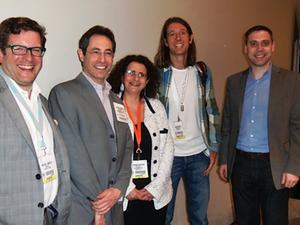 |
|
| (l.-r.) Michael Tamblyn, Kobo; Michael Cader, Publishers Marketplace; Dominique Raccah, Sourcebooks; Jason Merkoski, Amazon futurist and author; and Andrew Savikas, Safari Books Online. | |
Sourcebooks founder and publisher Dominique Raccah, moderating the session on the future of electronic reading, got to the heart of things when she asked the panel: "What has been the biggest surprise in book publishing in the last three years?"
Jason Merkoski, a futurist and technology evangelist at Amazon who helped launch the first three Kindles, and author of Burning the Page: The eBook Revolution and the Future of Reading (Sourcebooks), said he noticed, when walking the BEA floor, that "print still seems very prominent."
"I think the growth and proliferation of e-content is masked by the fact that it is ethereal," offered panelist Andrew Savikas, CEO of Safari Books Online.
Michael Cader, founder of Publishers Marketplace, predicted that in the future people will be astonished to know that we lived in an era in which someone invented and people paid a lot of money for a device "just to read books."
Savikas predicted that how rights are managed in publishing might be one of the greatest areas of change. Cader boiled down the question to, "Who will get compensated and how?" He said he could foresee a day when his grandchildren will question a time when publishers acted like "venture capitalists," offering advances to authors.
When the first Kindle came on the market Savikas--then at O'Reilly Media--said he was most struck by his mother-in-law's initial reaction to it. By calling the Kindle a bookstore, "she recognized its real value and that the more profound shift had less to do with reading habits than with buying habits."
Cader admitted that what has surprised him most has been consumers' habit of stocking up on e-books. He said he would have thought consumers would not need books beyond the one they were reading on their device, "but the marketplace has proven otherwise."
Michael Tamblyn, chief content officer at Kobo, arrived to the panel late and did not have much time to add his voice to the discussion. But he did say that we "sit on the brink of complete ubiquity," when every book will be available everywhere, all the time. And, he said, he is also excited by the idea that human book retailers retain the ability to find that exact right next book for their customers. Such a book, he said, "if given at the right time, changes the way you read."
Cader said that the marketplace will settle issues of pricing and distribution, and that unlike other industries that did not have time to adapt to changes technology brought to them, the book business has allowed for that and will continue to do so. "I see a lot more innovation than I think gets recognized," he said.
Until what Merkoski called this "hybrid era" of simultaneous print and digital reading gets worked out, the topic of the future of reading is sure to remain a prominent part of the conversation. --Bridget Kinsella

